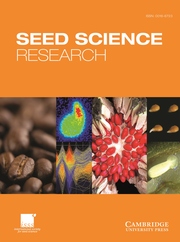Crossref Citations
This article has been cited by the following publications. This list is generated based on data provided by
Crossref.
Linkies, Ada
Graeber, Kai
Knight, Charles
and
Leubner‐Metzger, Gerhard
2010.
The evolution of seeds.
New Phytologist,
Vol. 186,
Issue. 4,
p.
817.
Guja, Lydia
Wuhrer, Richard
Moran, Ken
Dixon, Kingsley W.
Wardell-Johnson, Grant
and
Merritt, David J.
2013.
Full spectrum X-ray mapping reveals differential localization of salt in germinating seeds of differing salt tolerance.
Botanical Journal of the Linnean Society,
Vol. 173,
Issue. 1,
p.
129.
Baskin, Jerry M.
and
Baskin, Carol C.
2015.
Inbreeding depression and the cost of inbreeding on seed germination.
Seed Science Research,
Vol. 25,
Issue. 4,
p.
355.
Subbiah, Ashley
Ramdhani, Syd
Pammenter, Norman W.
Macdonald, Angus H.H.
and
Sershen
2019.
Towards understanding the incidence and evolutionary history of seed recalcitrance: An analytical review.
Perspectives in Plant Ecology, Evolution and Systematics,
Vol. 37,
Issue. ,
p.
11.
Qiu, Tong
Andrus, Robert
Aravena, Marie-Claire
Ascoli, Davide
Bergeron, Yves
Berretti, Roberta
Berveiller, Daniel
Bogdziewicz, Michal
Boivin, Thomas
Bonal, Raul
Bragg, Don C.
Caignard, Thomas
Calama, Rafael
Camarero, J. Julio
Chang-Yang, Chia-Hao
Cleavitt, Natalie L.
Courbaud, Benoit
Courbet, Francois
Curt, Thomas
Das, Adrian J.
Daskalakou, Evangelia
Davi, Hendrik
Delpierre, Nicolas
Delzon, Sylvain
Dietze, Michael
Calderon, Sergio Donoso
Dormont, Laurent
Espelta, Josep
Fahey, Timothy J.
Farfan-Rios, William
Gehring, Catherine A.
Gilbert, Gregory S.
Gratzer, Georg
Greenberg, Cathryn H.
Guo, Qinfeng
Hacket-Pain, Andrew
Hampe, Arndt
Han, Qingmin
Hille Ris Lambers, Janneke
Hoshizaki, Kazuhiko
Ibanez, Ines
Johnstone, Jill F.
Journé, Valentin
Kabeya, Daisuke
Kilner, Christopher L.
Kitzberger, Thomas
Knops, Johannes M. H.
Kobe, Richard K.
Kunstler, Georges
Lageard, Jonathan G. A.
LaMontagne, Jalene M.
Ledwon, Mateusz
Lefevre, Francois
Leininger, Theodor
Limousin, Jean-Marc
Lutz, James A.
Macias, Diana
McIntire, Eliot J. B.
Moore, Christopher M.
Moran, Emily
Motta, Renzo
Myers, Jonathan A.
Nagel, Thomas A.
Noguchi, Kyotaro
Ourcival, Jean-Marc
Parmenter, Robert
Pearse, Ian S.
Perez-Ramos, Ignacio M.
Piechnik, Lukasz
Poulsen, John
Poulton-Kamakura, Renata
Redmond, Miranda D.
Reid, Chantal D.
Rodman, Kyle C.
Rodriguez-Sanchez, Francisco
Sanguinetti, Javier D.
Scher, C. Lane
Schlesinger, William H.
Schmidt Van Marle, Harald
Seget, Barbara
Sharma, Shubhi
Silman, Miles
Steele, Michael A.
Stephenson, Nathan L.
Straub, Jacob N.
Sun, I-Fang
Sutton, Samantha
Swenson, Jennifer J.
Swift, Margaret
Thomas, Peter A.
Uriarte, Maria
Vacchiano, Giorgio
Veblen, Thomas T.
Whipple, Amy V.
Whitham, Thomas G.
Wion, Andreas P.
Wright, Boyd
Wright, S. Joseph
Zhu, Kai
Zimmerman, Jess K.
Zlotin, Roman
Zywiec, Magdalena
and
Clark, James S.
2022.
Limits to reproduction and seed size-number trade-offs that shape forest dominance and future recovery.
Nature Communications,
Vol. 13,
Issue. 1,
Gianquitto, Tina
2023.
Understanding Evolution in Darwin's "Origin".
Vol. 34,
Issue. ,
p.
333.
Pagano, Andrea
Macovei, Anca
and
Balestrazzi, Alma
2023.
Molecular dynamics of seed priming at the crossroads between basic and applied research.
Plant Cell Reports,
Vol. 42,
Issue. 4,
p.
657.
Zhao, Lijuan
Zhou, Xiaoding
Kang, Zhao
Peralta-Videa, Jose R.
and
Zhu, Yong-Guan
2024.
Nano-enabled seed treatment: A new and sustainable approach to engineering climate-resilient crops.
Science of The Total Environment,
Vol. 910,
Issue. ,
p.
168640.




